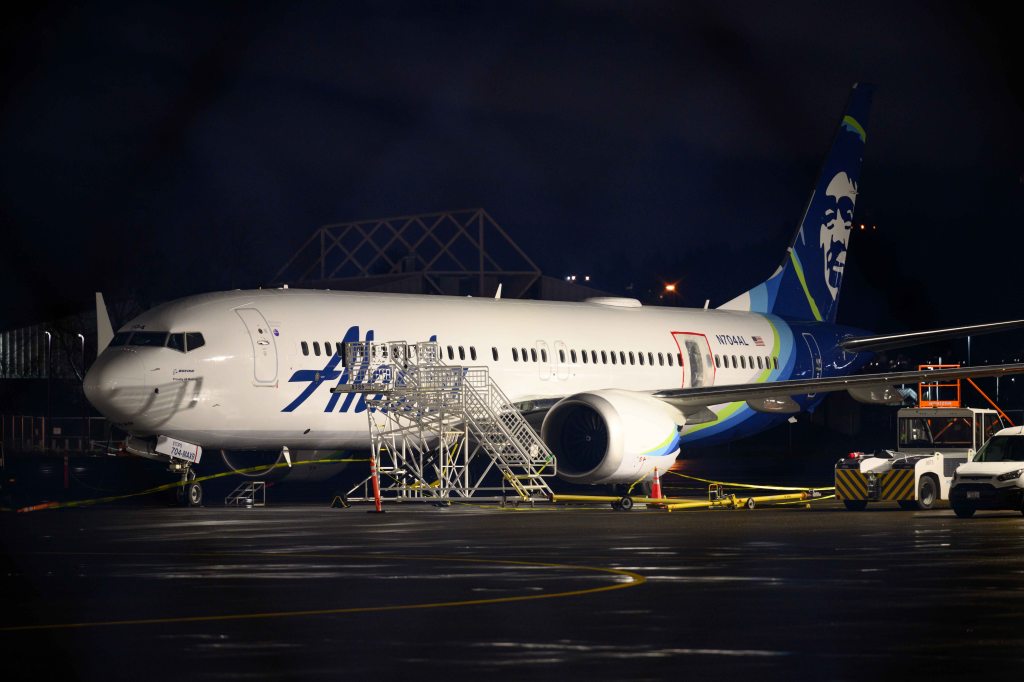Alaska Airlines CEO says loose bolts found on ‘many’ of its planes after near-disaster
The CEO of Alaska Airlines has ripped Boeing in the wake of the recent near-disaster, revealing that loose bolts were found on “many” of the company’s 737 MAX 9 planes.
CEO Ben Minicucci said that a new in-house inspection of the Boeing model in the fleet has uncovered that “many” of the planes had loose bolts.
“I’m angry. I’m more than frustrated and disappointed. I am angry,” Minicucci told NBC News Tuesday. “This happened to Alaska Airlines. It happened to our guests and happened to our people.
“And my demand on Boeing is what are they going to do to improve their quality programs in-house,” he added. “Boeing is better than this. Flight 1282 should never have happened.”
The CEO’s interview was the first since a door plug on an Alaska Airlines-owned 737 MAX 9 carrying 177 people lost a door plug in the skies over Oregon during a flight to California on Jan. 5, forcing the pilot to make an emergency landing.
The Federal Aviation Administration has ordered all MAX 9 jets grounded and launched a safety investigation.
The agency also announced an audit of the plane’s production line and suppliers “to evaluate Boeing’s compliance with its approved quality procedures.”
FAA Administrator Mike Whitaker told CNBC that the agency has “boots on the ground” at Boeing’s 737 MAX factory, adding that the staffers will remain there until they are convinced that the quality control system is up to snuff.
“We’ve got a lot of inspectors on the ground, visually inspecting the aircraft as it comes through,” Whitaker told the outlet Tuesday at FAA headquarters. “We’re shifting from more of an audit approach to a direct inspection approach.
“Until we’re comfortable that the [quality assurance] system is working properly … we’re going to have boots on the ground,” he said.
Whitaker declined to comment on when he expected the planes to return to service.
“It’s been difficult to predict, so we’ve sort of stopped trying. But as soon as we get it sorted out it’ll be up again,” he told CNBC.
Minicucci told NBC News that Boeing must now it will improve its quality control and prevent such incidents from happening again. Meanwhile, he said, the airline is incorporating its own added oversight on the production line.
“We’re sending our audit people to audit their quality control systems and processes to make sure that every aircraft that comes off that production line, that comes to Alaska has the highest levels of excellence and quality,” he told the network.

The CEO said that while the airline “was” planning to buy MAX 10s, the carrier will now evaluate “what the best long-term strategic plan is for Alaska(‘s) fleet mix” once the plane is certified.
“It’s clear to me that we received an airplane from Boeing with a faulty door,” he said.
“Now the NTSB investigation is going to figure out why that was a faulty door, whether it was bad installation, missing hardware, a manufacturing issue, but there’s no doubt that Alaska received an airplane off the production line with a faulty door,” Minicucci added.
Boeing told NBC News in a statement: “We have let down our airline customers and are deeply sorry for the significant disruption to them, their employees and their passengers. We are taking action on a comprehensive plan to bring these airplanes safely back to service and to improve our quality and delivery performance. We will follow the lead of the FAA and support our customers every step of the way.”
Meanwhile, United Airlines CEO Scott Kirby also expressed frustration with Boeing, telling CNBC that it is contemplating a future for its fleet without the 737 MAX 10.
“I think the MAX 9 grounding is probably the straw that broke the camel’s back for us,” he said. “We’re going to build a plan that doesn’t have the Max 10 in it.”
United has also said it found additional loose bolts on its MAX 9 jets.
“I’m disappointed that… this keeps happening at Boeing. This isn’t new,” Kirby told CNBC. “We need Boeing to succeed. But they’ve been having these consistent manufacturing challenges. They need to take action here.”
Read the full article Here


